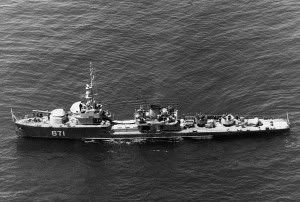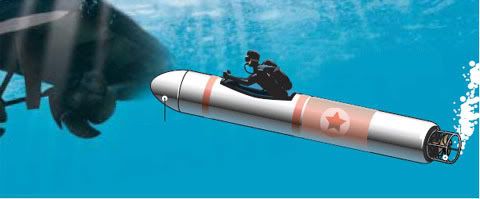
Tension in the Korean Peninsula is expected to heighten as a local newspaper says that the South Korean military intelligence submitted a report to President Lee Myung-bak saying that North Korea was responsible for the sinking of a Navy ship that killed 46 sailors. South Korean newspaper Yonhap said in a report that the strengthening of North Korea’s guerrilla warfare was the basis for the South’s suspicion that the Cheonan was hit by a submarine torpedo.
Earlier this week, Defense Minister Kim Tae-young also said in a report to Parliament that North Korea was the suspect in the tragedy. A South Korean investigator also claimed that “external explosion” probably caused the Cheonan to break on March 26.
North Korea has denied any involvement in the sinking, accusing instead South Korean President Lee of using the issue to bolster his party ahead of a coming local elections. Political analysts believe that it is highly unlikely that the South will react violently regardless if it was proven that the North fired at the Cheonan for fear of scaring investors.

The North is reportedly operating a brigade of suicide attack squads each in its East Sea and West Sea fleets. But it is still unclear whether the Navy corvette Cheonan was sunk by a North Korean human torpedo on March 26.
South Korea's military believes a torpedo fired from a North Korean submarine sank its navy ship last month, based on intelligence gathered jointly with the United States, a news report said on Thursday.
The Yonhap news report appears to be the clearest sign yet that Seoul blames Pyongyang for what would be one of the deadliest incidents between the rivals since the end of the 1950-53 Korean War. It puts more political pressure on President Lee Myung-bak, but analysts do not see it triggering a war.
The military's intelligence arm sent the report of "certain" North Korean involvement to the presidential Blue House soon after the incident, Yonhap quoted a high-ranking military source as saying.
Lee's government has come under criticism for what many see as its overly cautious handling of possible links to North Korea. It has called for a thorough investigation of the sinking, thought to have killed 46 sailors.
Market players have been calmed by the South's measured response, seeing Seoul as unlikely to take aggressive moves that would escalate into armed conflict and harm the export-driven economies of North Asia, responsible for about one-sixth of the global economy.
South Korea's defense ministry had no comment on the report.
"North Korean submarines are all armed with heavy torpedoes with 200 kg (441 lb) warheads," the military source was quoted as saying by Yonhap. "It is the military intelligence's assessment that the North attacked with a heavy torpedo.
"The military intelligence has made the report to the Blue House and to the Defense Ministry immediately after the sinking of the Cheonan that it is clearly the work of North Korea's military," the source was quoted as saying.
South Korea plans to soon raise the front half of the 1,200-tonne Cheonan, which went down near a disputed sea border with North Korea, and will issue its verdict on the cause of the explosion that sank the warship after that.
Analysts said there is little South Korea can do even if Pyongyang is found to be the culprit, because a military response was likely to hurt its own quickly recovering economy and bolster North Korean leader Kim Jong-il's standing at home.
Lee ended a decade of no-questions-asked aid to the destitute North and called for a hardline push for Pyongyang to disarm.
"The nuclear issue has still not been resolved. This and the Cheonan incident all serve to inflict a negative impact on the Lee administration," said Lee Nam-young, a political analyst at the Sejong University in Seoul.
The reclusive North has denied it had anything to do with the sinking near the disputed sea border off the west coast that has been the scene of two deadly naval battles in the past decade.
It accused Lee of using the incident for political gains ahead of crucial local elections in June.
South Korea has few economic options left to hurt the North. It has already suspended its unconditional handouts that once were worth more than $1 billion to the North, which has an estimated yearly GDP of $17 billion.
The greatest risk to the region is a brief armed conflict where North Korea fires tens of thousands of artillery shells into the Seoul area, home to about half of the South's 49 million people, and fires its hundreds of missiles at major cites in the South and Japan.
Yonhap said the South Korean and U.S. military suspected the North was stepping up drills to infiltrate a submarine south of the naval border, hidden among Chinese fishing boats, and wage a surprise attack against the South.
Navy 'Was Warned of N.Korean Human Torpedoes'
Military intelligence early this year alerted the Navy to the threat of "human torpedo" attacks from North Korea, which was pledging revenge for its defeat in a sea skirmish in November last year, it emerged Wednesday.
"Human torpedoes" are underwater suicide squads who operate torpedoes equipped with a mini motor or engine to sneak up to a target and blow it up.
"Military authorities detected several signs showing that the North was preparing for revenge for its defeat in the sea skirmish in November last year," a government official said. "The North intensively trained military units for various means of attack, in particular human torpedoes."
The North is reportedly operating a brigade of suicide attack squads each in its East Sea and West Sea fleets. But it is still unclear whether the Navy corvette Cheonan was sunk by a North Korean human torpedo on March 26.
Navy ships charged with defending the maritime frontline in the West Sea were ordered to keep at speeds faster than 12 knots to guard against any retaliatory attack from the North, but the Cheonan was traveling at only six knots before it sank, the official added. "Despite the possibility of retaliatory attacks, the Joint Chiefs of Staff had deployed Navy ships on duty at the West Sea frontline including Baeknyeong, Yeonpyeong and Socheong islands, closer to the frontline than in the past."






0 comments:
Post a Comment